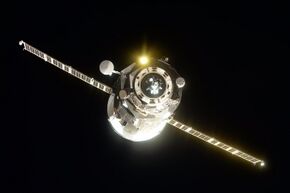Engineering:Progress MS-07
 Progress MS-07 docking with the ISS on 16 October 2017 | |
| Names | Progress 68P |
|---|---|
| Mission type | ISS resupply |
| Operator | Roscosmos |
| COSPAR ID | 2017-065A |
| SATCAT no. | 42971 |
| Mission duration | 194 days |
| Spacecraft properties | |
| Spacecraft | Progress MS-07 s/n 437 |
| Spacecraft type | Progress-MS |
| Manufacturer | RKK Energia |
| Launch mass | 7428 kg |
| Payload mass | 2549 kg |
| Start of mission | |
| Launch date | 14 October 2017, 08:46:53 UTC[1] |
| Rocket | Soyuz-2.1a s/n U15000-029 |
| Launch site | Baikonur, Site 31/6 |
| Contractor | Progress Rocket Space Centre |
| End of mission | |
| Disposal | Deorbited |
| Decay date | 26 April 2018 |
| Orbital parameters | |
| Reference system | Geocentric orbit |
| Regime | Low Earth orbit |
| Inclination | 51.67° |
| Docking with ISS | |
| Docking port | Pirs |
| Docking date | 16 October 2017, 11:04:07 UTC |
| Undocking date | 28 March 2018, 13:50:30 UTC [2] |
| Time docked | 163 days |
| Cargo | |
| Mass | 2549 kg |
| Pressurised | 1382 kg |
| Fuel | 700 kg |
| Gaseous | 47 kg |
| Water | 420 kg |
Progress ISS Resupply | |
Progress MS-07 (Russian: Прогресс МC-07), identified by NASA as Progress 68P, was a Progress spaceflight, operated by Roscosmos to resupply the International Space Station (ISS).
History
The Progress-MS is an uncrewed freighter based on the Progress-M featuring improved avionics. This improved variant first launched on 21 December 2015. It has the following improvements:[3][4][5]
- New external compartment that enables it to deploy satellites. Each compartment can hold up to four launch containers. First time installed on Progress MS-03.
- Enhanced redundancy thanks to the addition of a backup system of electrical motors for the docking and sealing mechanism.
- Improved Micrometeoroid (MMOD) protection with additional panels in the cargo compartment.
- Luch Russian relay satellites link capabilities enable telemetry and control even when not in direct view of ground radio stations.
- GNSS autonomous navigation enables real time determination of the status vector and orbital parameters dispensing with the need of ground station orbit determination.
- Real time relative navigation thanks to direct radio data exchange capabilities with the space station.
- New digital radio that enables enhanced TV camera view for the docking operations.
- The Ukraine Chezara Kvant-V on board radio system and antenna/feeder system has been replaced with a Unified Command Telemetry System (UCTS).
- Replacement of the Kurs A with Kurs NA digital system.
Launch
After a two-day delay, the Progress MS-07 lifted off on 14 October 2017, at 08:46:53 UTC. The spacecraft docked at the station on 16 October 2017, at 11:04:07 UTC. Progress MS-07 was launched from the Baikonur Cosmodrome in Kazakhstan, atop a Soyuz-2.1a rocket.[1]
Docking
Progress MS-07 was docked with the aft docking port of the Pirs module. This Progress flight was intended to mark the debut of the new two-orbit rendezvous profile which was not possible when the original launch date had to be scrubbed.[6]
Cargo
The Progress MS-07 spacecraft delivered 2,549 kg of cargo and supplies to the International Space Station for the six-person crew. The following is a breakdown of cargo bound for the ISS:[4][6]
- Dry cargo: 1,382 kg
- Fuel: 700 kg (for Zvezda service module)
- Oxygen: 23 kg
- Air: 24 kg
- Water: 420 kg
Spacewalk
Once the Progress arrived at the station, Expedition 53 commander Randolph Bresnik and flight engineer Joseph M. Acaba prepared for a spacewalk, on 20 October 2017, to accomplish a variety of maintenance tasks outside the complex. This included the replacement of a fuse on the station's Canadian-built Dextre robot, replacing an external camera and light fixture, and removing thermal insulation from two spare units to prepare them for future relocation.[4]
Undocking and decay
Progress MS-07 undocked from the Pirs on 28 March 2018, at 13:50:30 UTC. The vehicle continued with experiments until 26 April 2018.[6]
References
- ↑ 1.0 1.1 Gebhardt, Chris (14 October 2017). "Progress MS-07 launches, minus two orbit, 3.5-hour rendezvous Station option". NASASpaceflight.com. https://www.nasaspaceflight.com/2017/10/progress-ms-07-two-orbit-rendezvous-mission/.
- ↑ "Корабль "Прогресс МС-07" свели с орбиты перед затоплением" (in ru). RG.RU. 26 April 2018. https://rg.ru/2018/04/26/korabl-progress-ms-07-sveli-s-orbity-pered-zatopleniem.html.
- ↑ Krebs, Gunter (1 December 2015). "Progress-MS 01-19". Gunter's Space Page. https://space.skyrocket.de/doc_sdat/progress-ms.htm.
- ↑ 4.0 4.1 4.2 "Progress MS-07 2017-065A". NSSDCA. NASA. 14 October 2017. https://nssdc.gsfc.nasa.gov/nmc/spacecraft/display.action?id=2017-065A.
 This article incorporates text from this source, which is in the public domain.
This article incorporates text from this source, which is in the public domain.
- ↑ Zak, Anatoly (14 April 2017). "Progress-MS". Russian Space Web. http://www.russianspaceweb.com/progress-ms.html.
- ↑ 6.0 6.1 6.2 Zak, Anatoly (14 October 2017). "Mission of Progress MS-07 to ISS". Russian Space Web. http://www.russianspaceweb.com/progress-ms-07.html.
 |


